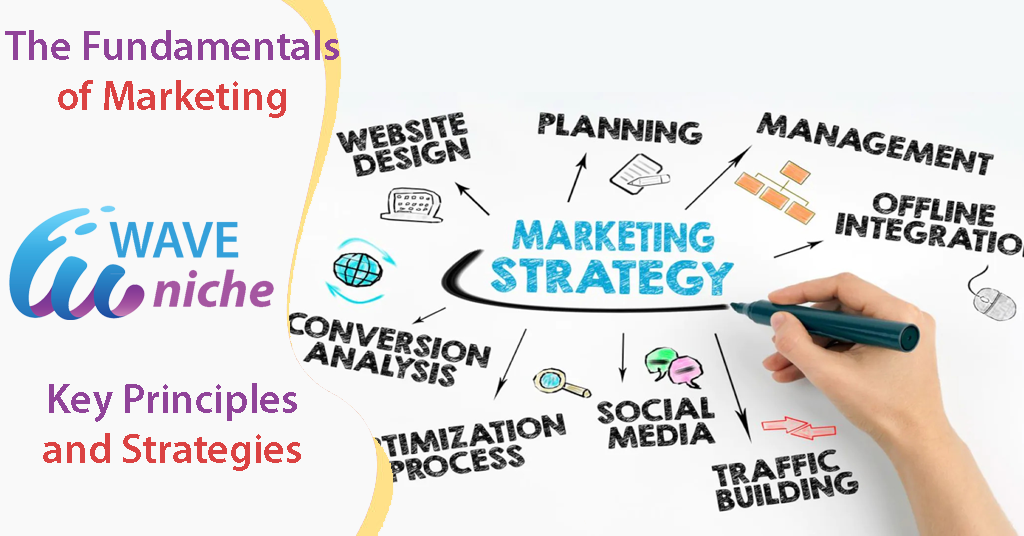Marketing is an important and integral part of modern business. In a dynamic and competitive market, understanding the basic principles and strategies of marketing is essential to the success of any organization. In this article, we will look at the key aspects of marketing and how they can be applied in the business environment.
Definition of Marketing:
Marketing is the process of planning and executing activities that aim to create, communicate and deliver value to customers. This includes market research and analysis, determining the target audience, developing products and services, creating marketing messages and implementing various marketing strategies.
Target audience:
Successful promotion begins with a deep understanding of the target audience. By conducting comprehensive market research and analysis, businesses can identify the specific demographics, needs, and preferences of their ideal customers. This knowledge forms the foundation for tailoring promotional strategies that resonate with the intended audience and drive engagement.
A target audience is a group of people or organizations at which a marketing effort is directed. To be successful, marketing must be targeted at the specific segment of the market that has the greatest potential to purchase the product or service. Target audience analysis is essential to determine the right marketing strategies and communication channels.
Product and Service:
The product or service offered by an organization must meet the needs and requirements of the target audience. It is important to understand how the product or service differentiates itself from the competition and what value it can offer customers. Developing the uniqueness and competitiveness of the product or service is essential to successful marketing.
Marketing Communications:
Effective communication with your target audience is critical to the success of your marketing efforts.
This includes using appropriate marketing channels and messages that will reach consumers and persuade them to choose the products or services offered. Marketing communications may include advertising, public relations, social media, direct marketing, and other tools that aim to create awareness, generate interest, and assist in the purchase decision.
Marketing strategies:
There are various marketing strategies that organizations can use to achieve their goals. Some of these include:
Market Segmentation: The division of the market into different segments and the targeting of marketing efforts to specific groups of consumers with specific needs and preferences.
Brand Positioning: Defining and emphasizing the unique characteristics and value of the brand to differentiate it from the competition and create an advantage in the market.
Marketing mix:
Using a combination of product, price, location, and promotional strategies to achieve a desired market position and satisfy customer needs.
Relationship Marketing: Focusing on creating and maintaining long-term and mutually beneficial relationships with customers, through personalized communications and value-added proposition.
Measuring Marketing Performance:
Evaluating marketing effectiveness is important for determining marketing results
efforts and to make informed decisions about future strategies. Measuring marketing effectiveness can be done by using key success indicators such as sales growth, customer satisfaction, repeat purchases, brand awareness, etc. This data can be collected and analyzed regularly to evaluate the effectiveness of marketing campaigns and make adjustments as necessary.
Digital Marketing:
With the growth of the Internet and social media, digital marketing has become an integral part of many organizations’ strategies. This includes using websites, social networks, email, content marketing, SEO (search engine optimization) and other digital tools to reach and engage with your target audience.
Personalized Marketing:
Now a days, consumers expect personalized attention and solutions from brands. The use of data and technologies, such as machine learning and artificial intelligence, enable organizations to create personalized experiences and offer individually targeted products and services that meet the specific needs of consumers.
Social responsibility and sustainability:
Today’s consumers are increasingly interested in the social responsibility and sustainability of the brands they choose to support. Marketing can play an important role in creating and communicating corporate responsibility and sustainability, such as highlighting renewable energy programs, social and environmental initiatives, etc.
Online analytics and performance measurement:
In the Internet age, we have access to an abundance of data and analytics tools that allow us to track and measure the results of marketing efforts. Online analytics provide information about what marketing campaigns work best, what channels and messages reach consumers, and what the impact is on their behavior and interactions with the brand. This allows marketers to tailor and optimize their strategies to achieve better results.

Innovation and adaptation to the changing technological environment:
Technological progress affects marketing by opening up new opportunities for communication and interaction with customers. Organizations must be flexible and adaptable to the changing technological environment in order to exploit new innovations and adapt to the new challenges and opportunities they present.
Building Influential Partnerships:
Collaborating with influential individuals or organizations can significantly amplify promotional efforts. Strategic partnerships allow businesses to tap into established networks and leverage the credibility and reach of trusted influencers. By partnering with like-minded entities or industry experts, businesses can expand their audience, enhance brand visibility, and generate valuable referrals.
Conclusion:
Marketing plays a key role in any business and is essential to achieving success. By understanding the basic principles of marketing and using the appropriate strategies, organizations can create a strong connection with their target audience, generate interest and loyalty, and achieve their goals. Adapting to the changing business environment and using new technologies and innovations are also critical to successful marketing.
Marketing is an indispensable function in modern business and provides essential tools and strategies that help organizations connect with target audiences and achieve their goals. Understanding the basic principles of marketing and applying them in the business environment can contribute to achieving success and competitive advantage. It is important to emphasize that marketing is a dynamic field that requires constant monitoring of trends and changes in customer behavior in order to adapt and adapt marketing strategies to the changing environment.




